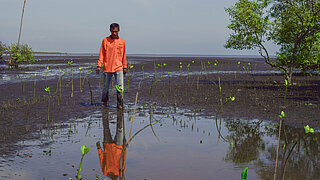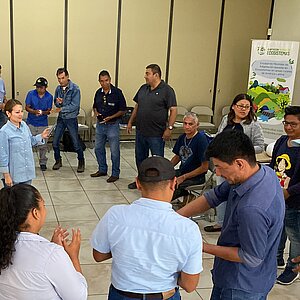Ecosystem-based Adaptation (EbA)
Prioritised field of action in the IKI funding area adaptation to the impacts of climate change (as of March 2024)

Intact ecosystems render important services that ensure their functional capability while generating multiple benefits for people at the same time. They can, for example, maintain soil fertility, ensure a supply of clean water and protect against flooding or erosion. These ecosystem services can help to improve the resilience of local populations to the consequences of climate change and mitigate its impacts.
A focus on impacts for humans
In the concept of ecosystem-based adaptation (EbA), the protection, restoration and sustainable use of ecosystem services and biodiversity form the basis for increasing people's resilience to the impacts of climate change. Oriented on humans, EbA is an approach that treats natural resources as supplementing other kinds of adaptation measures.
EbA looks explicitly at current and future changes to the climate, and focuses on their impacts on people and ecosystems. The objective is to minimise negative impacts. Thus, this approach differs from the conventional methods applied in the management of natural resources and biodiversity.
Important criteria for successful measures
EbA is aware of the value of biodiversity and ecosystem services for people. The approach searches for ways to secure these benefits under future climatic conditions while improving resilience to climate impacts at the same time. EbA integrates biodiversity and ecosystem services into extensive adaptation strategies to help people to better tackle the negative impacts of climate change. As a nature-based solution (NbS), EbA pursues a holistic approach.
Ecosystem-based adaptation
- is based on a comprehensive assessment of climate susceptibility, hazards and risks to people and the adaptation benefits emerging from ecosystem services.
- provides direct or indirect benefits increasing people’s resilience to climate change.
- restores, maintains and improves ecosystems.
- must be part of an overarching strategy for the adaptation of local populations to climate change and should be integrated into relevant policy frameworks and implementation plans.
- pursues a community-centred, participatory approach targeting gender justice, and boosts the local population's self-responsibility and capacity to act.
Win-win situations and cost-efficient adaptation
The effects of ecosystem-based measures are versatile: not only do they offer direct adaptation benefits, they also increase income, supply and the well-being of the people. At the same time, the approach often offers cost-efficient adaptation options. The restoration of ecosystems is often less expensive than technical solutions with a comparable adaptation effect. Such win-win situations make EbA particularly attractive.
In the field, EbA must be part of a wide-ranging adaptation strategy and should be integrated proactively into existing planning processes, such as those for land use. In coastal areas, specific EbA measures may be improved management, the protection or rehabilitation of mangrove forests and coral reefs, amongst others. If these ecosystems are stable, they protect coastal areas from more powerful storms as well as the consequences of sea levels rising.
Accounting for the effects of EbA measures
EbA measures can require large-scale decisions to prevent the unsustainable use of natural resources - such as when conservation areas restrict access to resources. Therefore, risk assessments, scenario planning and the management of adaptation measures should be integrated into participatory decision-making processes. This enables the impact on local communities to be identified and taken into consideration at an early stage and solutions that combine livelihood security, adaptability and ecosystem protection to be developed.
The IKI supports projects that conduct practice-based tests on ecosystem-based adaptation measures, and then processes and circulates the experience gained. Knowledge on the efficiency and cost-benefit ratio of these measures strengthens the concept and facilitates the comparison with other adaptation approaches. The NAP process serves as a framework for integrating proven EbA approaches into national, sub-national and cross-sectoral planning and budgets.
The Federal Environment and its partners bring the knowledge gained into international negotiations. The objective is to anchor NbS and EbA measures as effective adaptation strategies. IKI projects focusing on ecosystem-based adaptation have significantly raised the profile of this topic in the negotiations for both the United Nations Framework Convention on Climate Change (UNFCCC) and the Convention on Biological Diversity (CBD).
Synergies with other funding areas
Within the funding area of preserving and restoring natural carbon sinks, landscape-based approaches supplement the EbA approaches applied. Many projects in the conservation of biological diversity funding area are also relevant for adaptation and include ecosystem-based approaches.
Selected projects
- Global EbA Fund - Support for the Implementation and Upscaling of Ecosystem-based Adaptation
- Climate Change Adaptation in the Caribbean: The EbA-Facility
- Ecosystem-based adaptation on the northern central coast of Vietnam: restoration and co-management of degraded dunes and mangroves
- Strengthening Natural Hazard Disaster Risk Management through Ecosystem-based Adaptation and Insurance Protection
- Ecosystem-based Adaptation and forest restoration in vulnerable rural communities within the Caribbean Biological Corridor
Networks and tools
Video

Funding area
The IKI Strategy
The IKI wants to maximise its impact on climate action and biodiversity conservation. To this end, it concentrates its funding activities on prioritised fields of action within the four funding areas. Another key element is the close cooperation with selected partner countries, especially with the IKI’s priority countries.
The link has been copied to the clipboard












![[Translate to English:]](/legacy/_processed_/2/6/csm_20221027_EbA_Grafik_2_4a7ef53a48.jpg)


